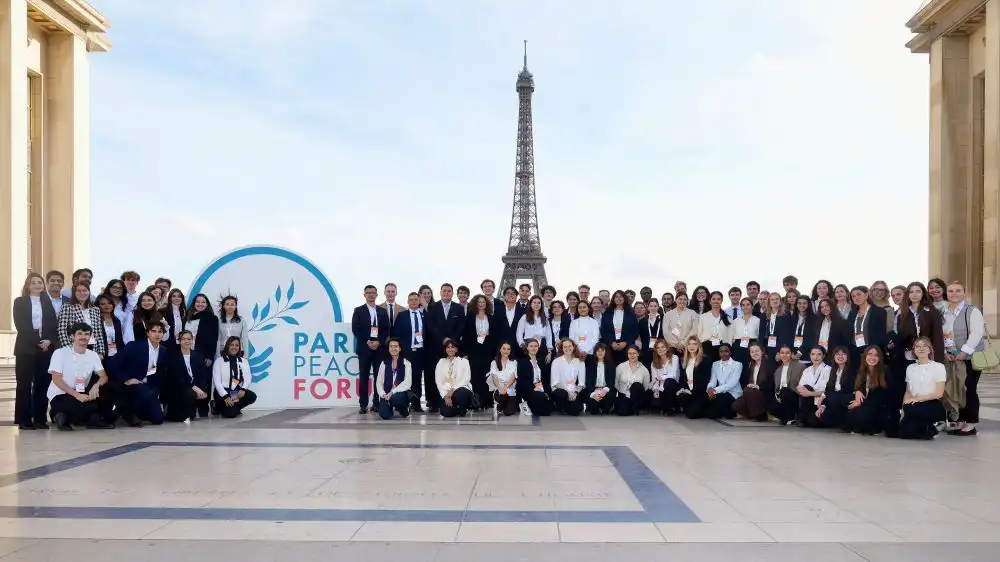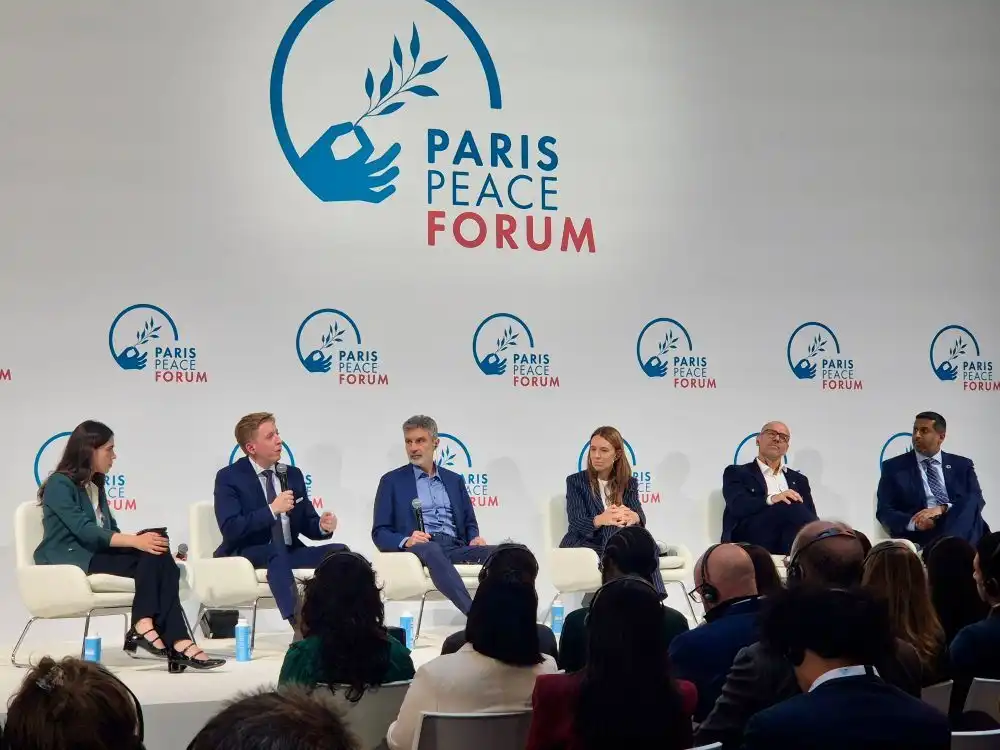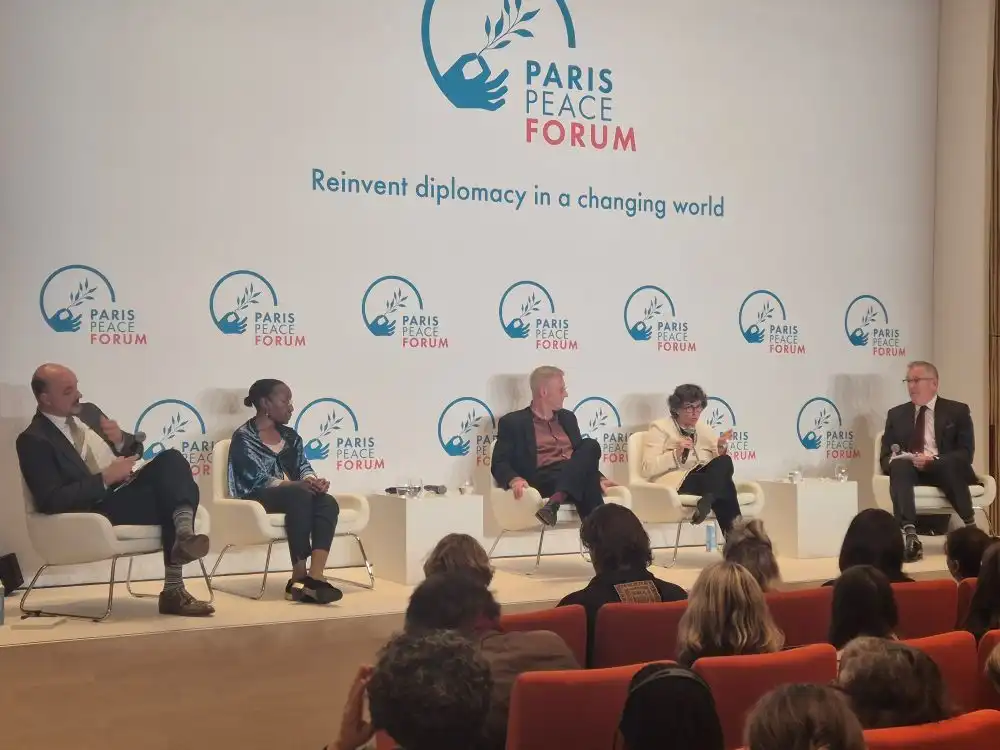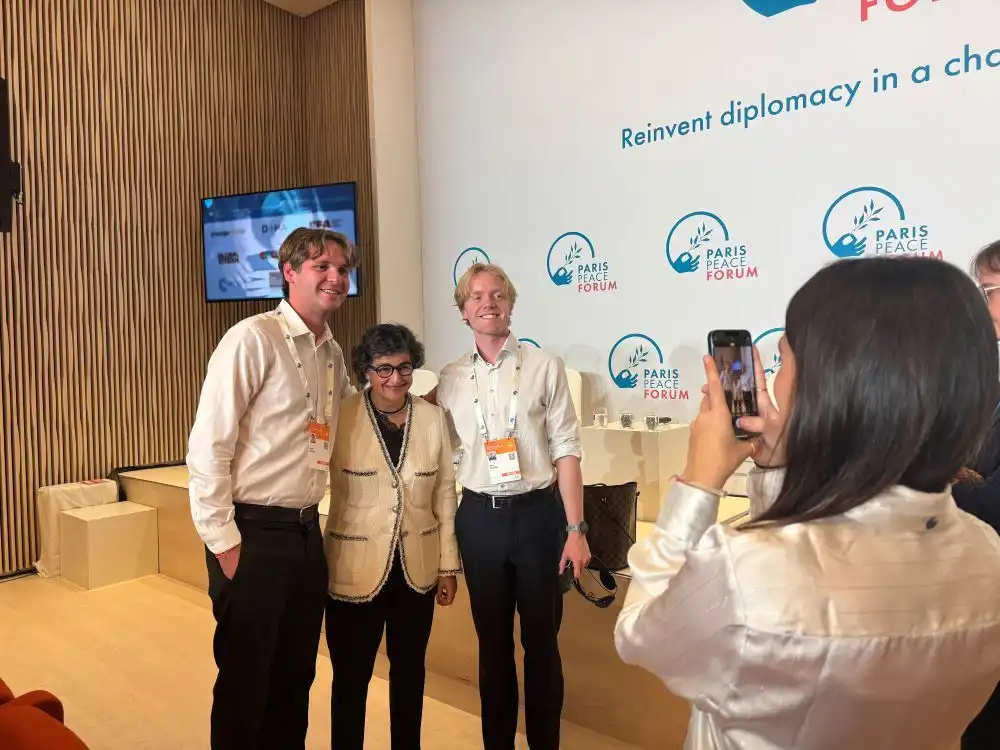Home>PSIA Students Make a Mark at Paris Peace Forum 2025
12.11.2025
PSIA Students Make a Mark at Paris Peace Forum 2025

What does it take to truly “reinvent diplomacy” in a crisis-ridden world? For students from Sciences Po’s Paris School of International Affairs (PSIA), the answer involved two days of intense volunteering and direct engagement at the heart of the Paris Peace Forum (PPF).
Michał Barszczak, a PSIA student and PSIA’s Events & Communications Assistant, had a ringside seat at this year’s Paris Peace Forum at the Palais de Chaillot. Along with more than 160 fellow PSIA students from the School’s 8 Master’s programs he attended and volunteered at the prestigious closed-door event. Here, he shares his experience as an International Governance and Diplomacy student, a member of the PSIA team, a volunteer, and (hopefully) a future diplomat.
The 8th Edition of the Paris Peace Forum: A Call for New Coalitions
Since its foundation in 2018, the Paris Peace Forum has been dedicated to "Reinventing Diplomacy in A Changing World" and working towards better global governance of public goods. This mission felt more vital than ever at its 8th edition, which took place at the Palais de Chaillot on 29-30 October 2025. Under the theme “New Coalitions for Peace, People and the Planet,” this year’s Forum had once again gathered world leaders, diplomats, civil society actors, and innovators. Among those distinguished guests our volunteers were able to meet Michelle Bachelet, Jacinda Arden, Mia Motley, Emmanuel Macron, Baiba Braze, Anne Hidalgo, Pascal Lamy - and many others.

At a time when geopolitical tensions challenge traditional cooperation, the event provided a crucial platform to explore new pathways for dialogue, trust, and collective problem-solving. This pursuit of impactful change is central to the student experience at PSIA. Every day, their academic journey challenges them to not only identify what needs to be changed but also to discover how to make that change happen effectively.
PSIA’s Enduring Partnership: From Founding to Volunteering
PSIA has been a dedicated partner since the Forum’s creation in 2018, standing as one of its initial founding institutions. This year , we were once again proud and ready to contribute to this annual event.
This longstanding partnership underscores PSIA’s deep engagement in the shared mission to advance innovative, cooperative solutions for peace and global governance. The top issues were reflected in the agenda, dominated by the peace coalition, international security, climate, AI and international governance. Getting the chance to attend this closed-door event was a unique opportunity for PSIA students to take their studies from the classroom to the frontline, actively engaging with the ideas and leaders shaping tomorrow’s world.
To be a volunteer at #PPF2025
The opportunity to volunteer at the Paris Peace Forum was presented at the very start of the academic year. Given the Forum's focus on essential issues like the persistence of climate catastrophes, cyberattacks, and the need to feed a still-growing world population - all cross-border challenges that demand international cooperation; and all issues that are covered through PSIA’s Masters - it's no surprise that the interest among students was immense.
Consequently, the official call for volunteers resulted in more than 160 dedicated PSIA master students becoming key players at the event. From managing delegations and communications to handling vital logistics, PSIA students didn't just attend; they were essential to the running of this leading global event. Volunteers, representing every PSIA program, lent their broad experience and deep interest to the Forum. Their robust participation truly embodied PSIA’s commitment to experiential learning, civic engagement, and global dialogue.

More than just an event, the PPF was a unique masterclass in global affairs and actionable new diplomacy. It was a chance to put theory into practice on a world stage. Here’s what student volunteers had to say about this capstone experience:
As a greeter at the Space for Solutions area, the highlight of the event for me was hearing how the big ideas discussed on the main stages were actually being implemented on the ground by members of civil society. I was amazed by the PPF’s commitment to placing civil society actors at the epicenter of international policymaking by giving them such an international platform.
Eunike MANGAMPA, Venue Greeter
Working at the Delegations Reception gave me a real sense of what global cooperation looks like up close. Guiding high-level guests such as embassy delegations, ministers and speakers meant constantly switching between languages and adapting to new situations on the spot. It made me appreciate how much coordination, openness, and human connection keep international relations running behind the scenes, all with a spectacular view of the Eiffel Tower throughout the day.
Felix Jonathan BAUR, Delegations Greeter
The experience was absolutely fantastic. I truly adored meeting decision-makers and having real conversations, getting first-hand opinions on current global affairs. Even though my role as a note-taker wasn't easy, the fact that I was there to capture every important detail made me actively listen and fully profit from the forum. Plus, seeing the large youth audience was always inspiring, with panelists frequently sending encouraging messages our way.
Răzvan UDROIU, Note Taker
From Local to Global: How Polarization Challenges the International Order
At the Forum, PSIA's commitment was also represented by the participation of PSIA Dean Arancha González as a distinguished speaker on a critical panel: From Local to Global: How Polarization Challenges the International Order. This discussion addressed the growing phenomenon of polarization, or radical disconnect as a global challenge that threatens both domestic stability and the established international peace and order.

The speakers asserted that this division is a dangerous construct, a fever that complicates all other solutions. Their consensus was clear: effective action requires balancing international reforms with domestic coherence. The focus must be on building trust, addressing deep-seated root causes like anxiety and exclusion, and fostering new "multipartial coalitions" and leadership capable of bridging divides across local and global levels.
Dean Arancha González anchored the discussion with a powerful, optimistic thesis: Polarization, or radical disconnect, is not programmed into human nature; it's a construct... So, let's not take this as some form of genetically included feature in our DNA that we cannot get rid of. We can get rid of it because we constructed it.


The European Voice: Rebalancing Global Order
For students studying international affairs, attending an event like the Paris Peace Forum as part of their studies is inherently empowering. This emotional connection is intensified when, within these global gatherings, international students see their own country’s delegation. As a student coming from Poland, a country that was long relegated to the peripheries of major global politics, it was deeply meaningful to Michał to witness the influential change currently taking place. This experience not only grounds his studies but also solidifies his belief that the expertise gained at PSIA will allow him to contribute directly to this change, acting for both his nation and the European Union.
Amidst many panels attended, one was particularly important to him as an International Governance and Diplomacy student specializing in European Affairs: Rebalancing Global Order: Can Europe Find Its Voice?
In the fallout from the Russian aggression on Ukraine, rising US-China tensions, and pervasive global instability, Europe’s security and dependencies are under severe threat. With established alliances shifting unpredictably under the Trump administration, Europe has recently found itself paying the price for such global instability. The panel addressed crucial questions: Can Europe reconcile its economic model and values with the demands of realpolitik? Will the continent find a coherent, sovereign voice and project power in this new multipolar world?

A Blueprint for Future Diplomats
The Paris Peace Forum 2025 was more than just another event - it was a capstone in putting theory into global practice. For students who volunteered, it solidified the core message of their education: reinventing diplomacy is not a distant concept, but an active, ongoing process that demands engagement. From managing critical logistics and facilitating high-level conversations to serving as note-takers for panels on global polarisation and European strategy, PSIA students didn't just witness the workings of international governance, but they became an essential part of it. This hands-on experience, seeing the complexity of forging new action coalitions firsthand, provides an invaluable blueprint for their future careers, transforming academic ambition into tangible diplomatic experience.
The student volunteers left the Palais de Chaillot not just with memories, but with a deeper appreciation for the coordination, openness, and human connection that keeps international relations running, ready to apply their knowledge and commitment to building a more peaceful and cooperative future.
Information Sessions: Masters

Find out more about the Masters programs and the wide choice of specialisations offered by the 8 Schools of Sciences Po during our webinars dedicated to applicants.